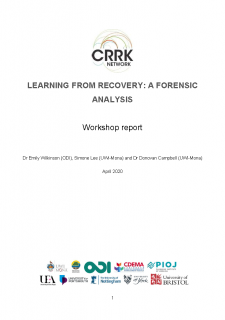A Forensic Analysis of Disaster Recovery
The Caribbean Resilience and Recovery Knowledge Network (CRRKN) was set up in November 2019 to encourage knowledge exchange and learning between researchers, policymakers and practitioners, to generate a research agenda and promote more equitable and sustainable recovery after disasters and a more resilient future for the Caribbean. It will do this through a set of structured activities, including an online webinar series. The first of these activities, a Forensic Workshop on Disaster Recovery, was held on Sunday 1 December 2019 as foreground to the 11th Caribbean Comprehensive Disaster Management (CDM) conference in Sint Maarten. This workshop was the first event of its kind in the Caribbean.
In a region beset by serial disasters, effective recovery from hazardous events is not just a worthy goal it is an imperative. Yet post-disaster recovery planning is not the norm; prioritization and allocation of resources is typically centralised and top-down; and social, economic and environmental processes of recovery and trajectories are not well understood. The CRRKN aims to support a transformational approach towards post-disaster recovery across the Caribbean, particularly as it recovers from the impacts of the 2017 hurricane season that caused $130 billion of losses and the Covid-19 crisis, the costs of which are still unknown. This can be achieved by institutionalising lessons from past events; stimulating and enhancing recovery planning; and bringing about a cultural shift in the way recovery is understood across the Caribbean.
A community of researchers, practitioners and policymakers is emerging, motivated by an ambition to achieve these transformations, but constrained by ad-hoc and short-term research and development funding. Research and practice are contributing to useful outcomes that alleviate the worst symptoms of disasters; but they are collectively less effective at encouraging long-term resilience to future events, strengthening ecosystems or reducing vulnerabilities in poor or remote communities. In particular, after disasters, a plethora of reports and guidance is issued on how to ‘build back better’ and promote more sustainable and equitable recovery, but these lessons are not incorporated into planning for -or decision-making after- the next event, and mistakes are often repeated.
The CRRKN seeks to remedy this by joining together diverse researchers, and by building stronger linkages with practitioners and policymakers. Researchers work on wide-ranging topics relevant to hazard mitigation, sustainability and resilience in the Caribbean, connected by their desire to improve recovery from the ever more frequent and devastating impacts of disasters. Practitioners bear responsibility for ensuring the best possible outcomes for communities at risk and face increasing challenges associated with climate change and environmental degradation in the region. But until research informs and is informed by policy and practice, outcomes will continue to be suboptimal.
The Network is therefore both timely and needed.
A series of mutually beneficial activities are being planned to help achieve the overall aim of transforming post-disaster recovery. The forensic workshop held in Sint Maarten brought multiple perspectives to bear on understanding post-disaster recovery in different states, over different time periods and for two very different kinds of hazard ‘events’: post-Hurricane Maria (2017) in Dominica and post- volcanic crisis in Montserrat (1995- 97). The CRRKN will run a similar event in 2021, bringing more regional stakeholders into the process. The aim is to establish a formal mechanism or blueprint for post-disaster reflection and learning. Through these discussions, the CRRKN aims to galvanise interest across the region in standard setting and benchmarking good practice in disaster recovery, giving meaning to the notion of ‘building back better’. This will include a focus on recovery after the 2020 Covid-19 Pandemic.

